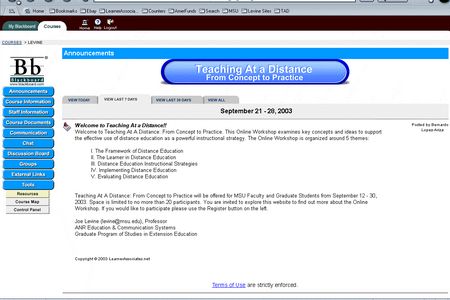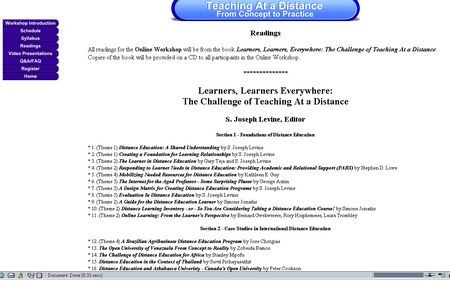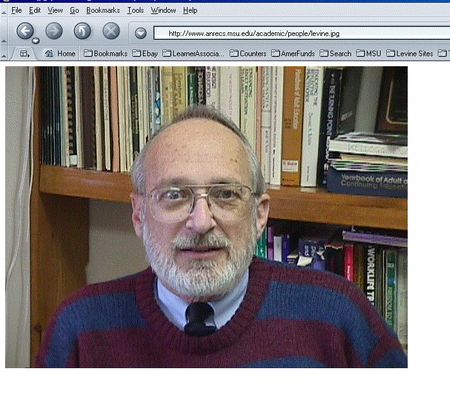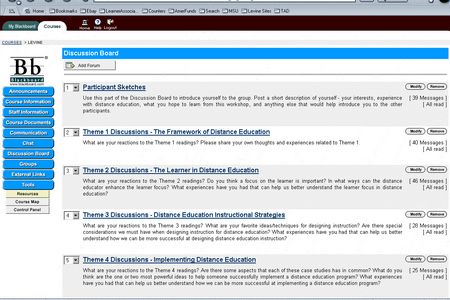- View the PowerPoint presentation
- Read the assigned chapter(s) in the text
- Share your thinking/receive feedback on the Discussion Board
- Post on the Discussion Board your reaction to the ideas of others
- Take the Self-Test

IMPORTANT ANNOUNCEMENT:
The April/May 2007 session was the final workshop to be offered. After a very successful 4 years of offering the Online Workshop, new priorities/projects are demanding more and more attention and it was time to move on to them. However, due to the many requests that I have received, the workshop materials (PowerPoint presentations, discussion questions, resource links, discussion board, etc., etc.) will be made available - for free - here on this website. This will allow educators, alone or in small groups, to participate in their own self-directed workshop on how to teach at a distance. If you would like to receive an announcement when Teaching At A Distance - Self-Directed is available, please enter your email address in the box below. Joe LevineSyllabus
The real challenge behind a syllabus for a
distance education program is to balance the technology that will be used with
a strong emphasis on the personal side of learning. A good distance
education syllabus will be the first step in building a sense of relationship
between the instructor and the learners and among the learners. It will become
a cornerstone of the program.
The Online Workshop has been organized with
two very clear learning objectives in mind. The first objective is a cognitive
objective (dealing with the content that will be delivered) and is the most
obvious - Cognitive
Learning Objective: Please note that the focus is on the
learner and not the content. Certainly the content is important but the emphasis of the workshop is on the key role that the learner plays in distance education. The second objective is also focused on the
learner. However, this objective is not focused on cognitive learning - it is
focused on affective learning (dealing with the feelings and emotions that are
always present in a learning situation). Affective
Learning Objective: This objective is just as important as the
first. It is concerned with providing an opportunity for each participant
to experience what it feels like to learn at a distance.
The website for the
Online Workshop is the key to our interaction. Once you register you will
receive your Login and Password to enter the workshop website. Check out the discussion board postings from a recent workshop. We will be using selected
chapters from the new book, "Making Distance Education Work: Understanding Learning and Learners At a Distance." These chapters will be a major form of content
input during the workshop and will serve as the basis for online dialogue and
discussion. It will be important for all participants to do the reading in a
timely manner. All participants will receive their own personal copy of the book (via regular mail). In addition, the book will also be made available as an eBook on the workshop website. PowerPoint presentations have been prepared for each of the 5 workshop themes. The idea of the presentations is two-fold - to introduce and clarify
each of the five themes and to create
a more viable learning environment (something that can be very difficult to
create in distance education). Each presentation is limited to no more than 15 minutes in length and can be viewed directly from the workshop website.. This workshop has been set up
so that it's possible for each participant to interact in an entirely
independent/asynchronous manner - checking into the discussion board when
convenient, reading the text when time is available, watching the PowerPoint presentations in the
privacy of one's own home, and taking the self-tests to see how you're doing. Though every attempt has been made to create a
technological learning environment that works 100% of the time, there are
certain to be problems along the way. Please remember, when all else fails, email
the lead instructor! I'll try and respond as soon as possible. And, if possible,
I'll try and solve whatever the problem might be. (levine@learnerassociates.net) Don't wait until the problem
gets out of control. During each segment/theme of
the Online Workshop you will be responsible for doing the following activities: It probably appears like a
lot more work than it really is. Besides the readings and the PowerPoint, the key
will be to regularly check into the Discussion Board to see what others are
saying and to share your own thinking. Probably 15-20 minutes online, once or twice
each day, will keep you involved with the learning. Each theme will be the focus of our attention for an entire week - providing lots ot time for meaningful interaction. Check into the Discussion Board as often as you would like.
For each of the five workshop themes there is included on the website a short self-test to see how you're doing.
The Discussion Board is the "heart" of our workshop. You will be encouraged to post a short biographical sketch about yourself (and a digital picture if you have one) and to share your comments/ideas about each of the five themes (and to react to the
comments of others). The Discussion Board (and the entire website) will be available to all participants for one month following the conclusion of the workshop. After you have registered for the Online Workshop
you will receive an email that includes your password that will give you
access to the Workshop’s website/Discussion Board and an electronic copy of the eBook "Making Distance Education Work: Understanding Learning and Learners At a Distance". (In addition, a personal copy of the book will be sent via regular mail to each participant.) Experiment with the different features of the
Discussion Board. You will find it very
easy to use. Check out the discussion board postings from a recent workshop.
Participants are encouraged to share their ideas about an actual distance education program during and following our program.
No need to worry about how complete your design is. Put together a rough draft,
post it on the Discussion Board or as an email to the instructors and have an opportunity to receive feedback on your idea. Not sure if the online workshop is really for you. Try your hand at the Pre-Assessment that has been included. The Pre-Assessment should further clarify the workshop focus and how it fits your own learning needs.Our
Learning Objectives:
At the conclusion of the online workshop each participant will be able to
effectively create a plan for the implementation of his/her own distance
education instruction.
At the conclusion of the online workshop each participant will have actively
participated in a real distance education program and will be able to use the
feelings of that experience as a frame of reference for their own distance
education teaching.Our Website:

The Instructors:
The instructors are committed to helping the participants develop a knowledge base relating to
distance education and also to provide an opportunity to experience first hand what being
a learner at a distance feels like. Once
the program is operating the instructor role is one of clarifier, reinforcer, challenger and
encourager. The content (knowledge base) is already in
place through readings and the audio/visual presentations.
The interaction system is also in place and ready for everyone's use.
Our
Text:

The Audio/Visual Presentations:
A Human is Available!

What You Will Be Doing:
Isn't That A Lot Of Work!
Test Yourself:
The Discussion Board:

And finally –

